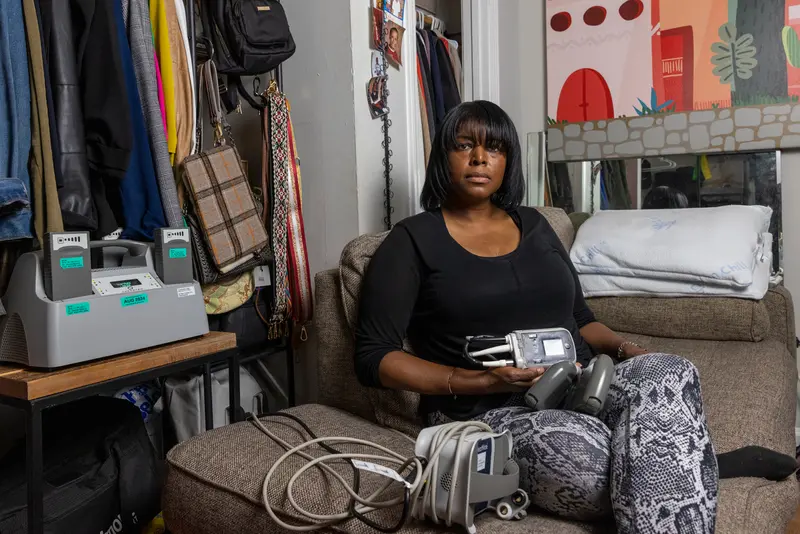In early 2019, Tina Marie Marsden needed more time to pay her electric bill. A mother in her mid-40s who lived on a fixed income because of a medical disability, she tried to explain to the local utility that the prospect of having no electricity was more than just an inconvenience. A mechanical pump kept her heart beating, and the pump ran on batteries that needed to be frequently charged. If the batteries ran out, Marsden could die.
Marsden had recently moved nearly 40 miles south of downtown Atlanta to Griffin, Georgia, a city that provides electricity to more than 13,000 residents through the utility it owns. Griffin offered customers only a seven-day period to pay past-due bills before cutting off their power — regardless of their health.
Before moving to Griffin, Marsden had gotten her electricity from Georgia Power, the state’s largest utility. State energy regulators require Georgia Power to delay disconnecting a seriously ill customer for failing to pay if they provide proof of a medical condition. Customers are eligible to request a grace period of up to two months.
After seven days passed, the city shut off Marsden’s power. She called her family, pleading with her relatives to lend her money. She cobbled together enough cash to pay the city, and her power was restored before the day ended.
Her relief was short-lived. That spring, when Marsden again fell behind on her bill, she asked a Griffin employee to consider her need for consistent power due to her heart condition. But the employee warned her that her condition would not keep her from being disconnected for nonpayment. The following month, when she missed another due date, the city cut off her power — and did so multiple more times in the years that followed.
Georgia is one of more than a dozen states that require certain utilities to delay disconnections for seriously ill customers for 60 days or more, according to a National Consumer Law Center report. But Georgia’s regulation does not apply to its nearly 100 small electric utilities. These utilities, which are largely overseen by local elected officials or nonprofit board members, can choose to immediately disconnect seriously ill residents who fail to pay their bills on time. Only a handful of states, including Wisconsin and New York, have oversight of municipal utilities and require them to protect seriously ill customers.
“The theory of municipal utilities is ‘Oh, it’s run by the government, it’s got to be better for people,’” said Charlie Harak, an attorney with the National Consumer Law Center, a nonprofit that specializes in consumer protection issues. “Few people are closely watching how they operate.”
As is the case in many states, no Georgia agency tracks how often utilities disconnect people who rely on electric-powered medical devices. ProPublica has identified examples of these kinds of shut-offs across the state. In the small south Georgia city of Fitzgerald, the municipally run utility shut off power eight times to a man receiving at-home dialysis treatment. Another utility in Palmetto, less than 25 miles southwest of downtown Atlanta, several times disconnected a woman reliant on a device to treat sleep apnea, even after she submitted a letter from her medical provider saying losing power could kill her. In the northeastern Atlanta suburbs, Lawrenceville’s utility disconnected a woman who used an oxygen concentrator to treat her chronic obstructive pulmonary disease, leading her son to file a complaint with the utility. “I didn’t know you could just keep shutting off power w a disabled person on oxygen,” he wrote.
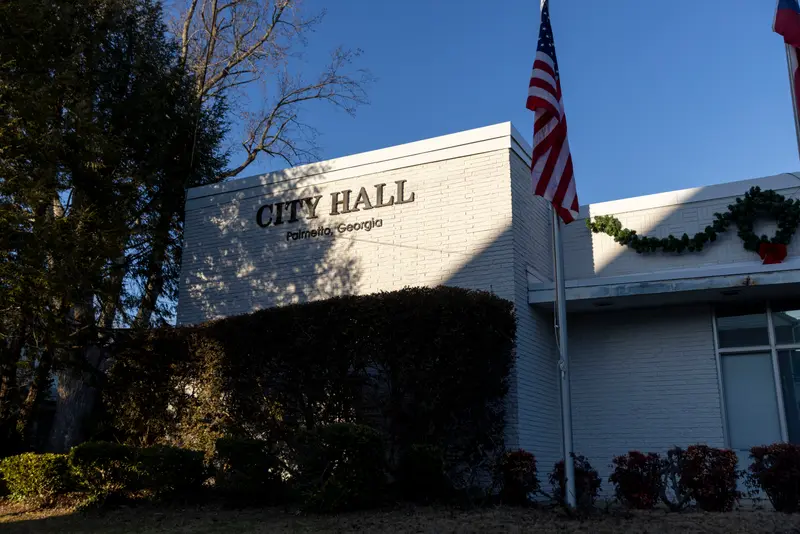
Representatives for the cities of Fitzgerald and Palmetto told ProPublica that the cities have tried to help seriously ill customers, but noted that they don’t have formal policies addressing those customers. (Fitzgerald declined to respond to questions about the customer who was disconnected.) Lawrenceville has a policy stopping disconnections for customers who turn in documentation from a medical professional of a serious illness; utility officials told the son of the woman with COPD about the policy after he complained about the shut-off, according to emails ProPublica received in a records request.
Griffin Mayor Douglas Hollberg, along with the city manager, declined to answer questions about Marsden, even after she signed a document waiving her right to privacy so the city could discuss her account. In an interview, Hollberg said that his utility strives to accommodate seriously ill customers. However, he said, some people “want to abuse the system” and leave other taxpayers footing the costs.
“We're talking about someone that doesn't want to pay their power bill and thinks that we shouldn't shut them off because they don't want to pay their bill,” Hollberg said. “I'm tired of people wanting to have rights beyond anybody else's rights.”
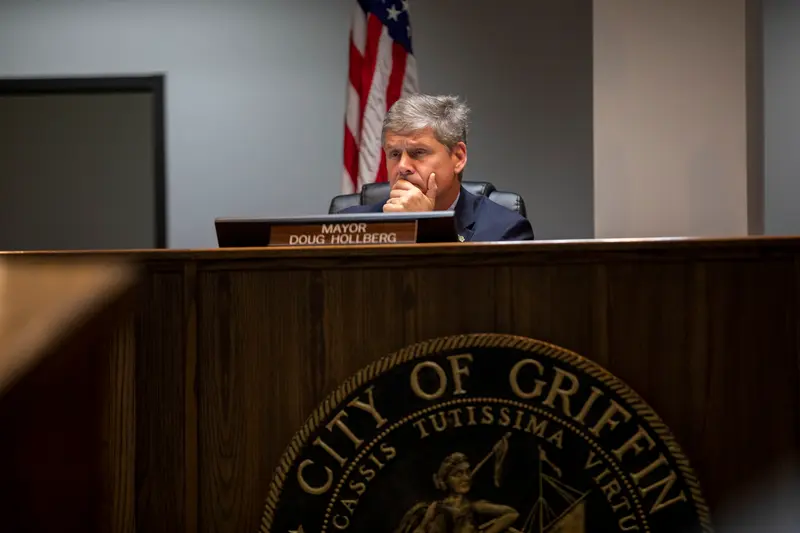
Dozens of Georgia’s other small utilities offered ProPublica a variety of explanations for why these kinds of disconnections are necessary. Some executives said that their utilities address people’s need to power their medical devices on a case-by-case basis, while others pointed to financial assistance programs they provide to help customers in need. One Georgia utility maintains an emergency fund supplied by contributions from its employees; another provides customers with a list of local charities that might be willing to cover their overdue bills.
Other officials expressed concern that allowing seriously ill people long periods of time to pay could cost utilities too much.
“There are people who will not be honest with the power provider, and they will use the medical thing to pretty much say, ‘You can’t cut my power off,’” said Mark Bolton, a spokesperson for Coastal Electric Cooperative, a utility that serves 22,000 customers in southeast Georgia. “But we can’t give you free power forever, either.”
Across the country, people who use electric-powered medical devices have died after their late payments triggered utility disconnections, and not all involved small utilities. In 2015, Lester Berry, a 70-year-old Texan with chronic pulmonary disease, died after a disconnection left him without the ability to use his oxygen-producing device. In 2018, a New Jersey utility with more than 2 million customers disconnected power for Linda Daniels, a 68-year-old piano teacher, who gasped for hours without her breathing machine. Daniels’ death led New Jersey legislators to pass “Linda’s Law,” which requires utilities to confirm with customers whether someone in their home relies on an electric-powered medical device before moving forward with a disconnection.
“No one should fear losing their life because their electricity bill is a few days overdue,” Gov. Phil Murphy said upon signing the law in 2019.
Consumer advocates and medical experts say that utilities — and the officials who regulate them — should protect customers whose health could be imperiled by a disconnection. A handful of smaller utilities in Georgia have adopted policies to postpone disconnections for seriously ill customers, according to information obtained by ProPublica through open records requests and survey responses. Experts and residents who spoke with ProPublica said the additional time allows people to apply for financial assistance from local nonprofits, borrow money from family or friends or negotiate a plan with the utility company to pay their bills.
“More time means I can come up with the money on my own,” Marsden said. “More time allows me to keep my pride, maintain my independence and not have to ask others for money.”
Dr. Peter Kahn, a pulmonologist and critical care fellow affiliated with Yale University’s medical school who studies the health impacts of disconnections, said patients of his who have asked their utilities for extra protections are not “looking for a free ride,” but rather seeking help for crucial needs.
“The cost of fighting with people who are looking for small protections over the long term is just not worth it,” Kahn said.
In 2019, around the second time that Marsden’s power was disconnected, she met a woman through a Facebook group called LVAD Friends, where people trade tips about their experiences with a type of heart pump known as a left ventricular assist device. The friend’s utility had threatened to disconnect her power after she fell behind on her monthly payments.
Concerned for her friend, Marsden traveled to Atlanta to seek help from the Georgia Public Service Commission. She thought her elected energy regulators could delay the city from cutting off her friend’s electricity. Instead, the PSC staff told her there was nothing they could do: The commission could help enforce protections for people who get electricity from Georgia Power but had no authority to oversee the disconnection practices of smaller utilities like the one that provided electricity to Marsden’s friend.
City-run power companies and nonprofit electric cooperatives initially sprang up as an answer to inequitable access to electricity in rural parts of the country. In the early 20th century, officials in rural Georgia built their own grids and farmers banded together to fund the construction of power lines that brought electricity to residents outside of major cities. By the 1950s, the vast majority of rural Georgia residents could light their homes, catching up with people living in larger cities like Atlanta and Augusta.
Over the decades that followed, the PSC heightened protections for seriously ill customers of Georgia Power. But in Georgia, as in a number of states across the country, cities lobbied legislators to fend off state oversight of their utilities. Soon after Marsden moved to Griffin, she realized that seriously ill Georgians outside of major cities were being left behind once again, subject to disconnection practices that threatened their quality of life.
In July 2020, Griffin cut off electricity at the home of Kenneth Parson, a retired trucker with diabetes who needed power to refrigerate his insulin. His wife begged city officials to reconsider their decision during the pandemic. The city said it could only restore power once he paid his bill. For more than two months that summer, Parson stored his insulin in a cooler packed with ice. Griffin later cut off power for Tracey Hardaway, who also needed electricity to store insulin pens. Hardaway said she and her husband had paid all but $30 of a more than $250 bill and promised city officials they would gather the remainder in a couple of days. “They would not keep the power on for those two days,” Hardaway said.
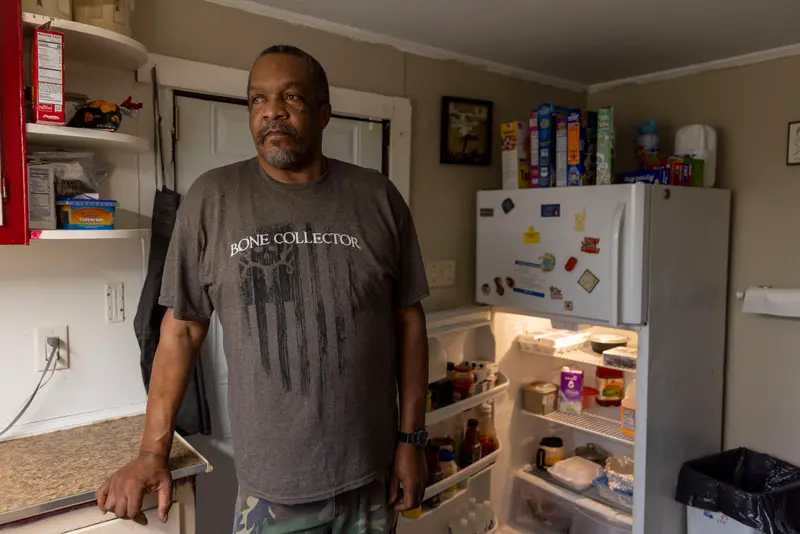
In recent years, Griffin distributed small grants from a $250,000 program that was funded through the federal CARES Act, which provided emergency financial assistance to Americans during the pandemic. Griffin's city manager declined to answer questions about Parson or Hardaway or provide details about whether they received financial assistance from the city.
A few months after Marsden went to Atlanta to advocate for her friend, Griffin disconnected her power for the third time that year. The clock was ticking: Her heart pump’s battery lasted only 12 hours. When the latest disconnection left Marsden without power for three days, she kept the pump running with the help of a neighbor, who let her run an extension cord between their apartments to charge her batteries.
In June 2021, Marsden was only able to pay about three-quarters of her $365 monthly bill and was at risk of disconnection for a fifth time. Before living in Griffin, she had been accustomed to her local government charging her for water, sewer and garbage collection. Here, the city bundled its electricity charges and those other municipal services into a single monthly bill, which meant that she couldn’t choose to pay only for her electricity. After seven days of Marsden not paying the full bill, the city cut off her power again. “I need power to live,” she recalled thinking. “Is Griffin going to let me die over $80?”
That fifth disconnection spurred Marsden to take action. She tracked down disconnection policies of other small cities across the country and found that some were more forgiving than Griffin to people with electric-powered medical devices. She reached out to city officials to encourage them to adopt a better policy, arguing they were unfairly penalizing residents with disabilities.
Her advocacy prompted city officials to review the disconnection policies. In an internal email ProPublica obtained through a records request, a city attorney erroneously told other staffers that Griffin had “adopted the same policies as Georgia Power.” (A city spokesperson declined to comment about Griffin’s interpretation of Georgia Power’s policy.) The response that reached Marsden was disappointing: The city “will not alter this policy,” a city official wrote. But, that official said, Marsden was welcome to charge her heart pump batteries at City Hall.
Frustrated by Griffin’s response, Marsden decided to speak out at the city commission meeting that September. As she waited anxiously to face her elected officials, her heart raced so fast that she was zapped by her defibrillator, which shocks her heart whenever it beats faster than 220 beats per minute. She cried out loud enough for the commissioners to pause the meeting and for someone to call 911.
The paramedics urged Marsden to immediately go to a hospital for observation, but she insisted on speaking first during the public comment period. They reluctantly agreed. Too weak and out of breath to stand at the dais, Marsden sat in the front row of the audience. She criticized the city for its rigid disconnection policy and urged them to protect their most vulnerable residents.
“We are not asking not to pay,” Marsden said. She went on to ask Griffin to change its policies “so customers who need power to live are not at risk of disconnection, or risk loss of life due to disconnections.”
ProPublica surveyed about three dozen municipal utilities and electric cooperatives of various sizes across the state and found a variety of disconnection policies. About a third of those utilities had policies requiring them to delay disconnections for seriously ill customers. College Park, a small city near Atlanta’s airport, gives residents up to six months to pay their bill without disconnection if they submit a letter from a medical provider. The rest of the utilities that responded didn’t have a policy requiring delays in disconnection for those customers.
Palmetto, just southwest of Atlanta, is one of the municipal utilities without a policy, as 56-year-old Aleica Dockery found out in late 2022. Over a decade earlier, a car accident had killed her daughter and left Dockery using a wheelchair. Dockery provided city officials with a letter from a medical provider notifying them she needed continuous electricity to use her CPAP machine, a device that she used to treat her sleep apnea. The medical provider warned that a disconnection “could lead to catastrophic consequences up to and including death.”
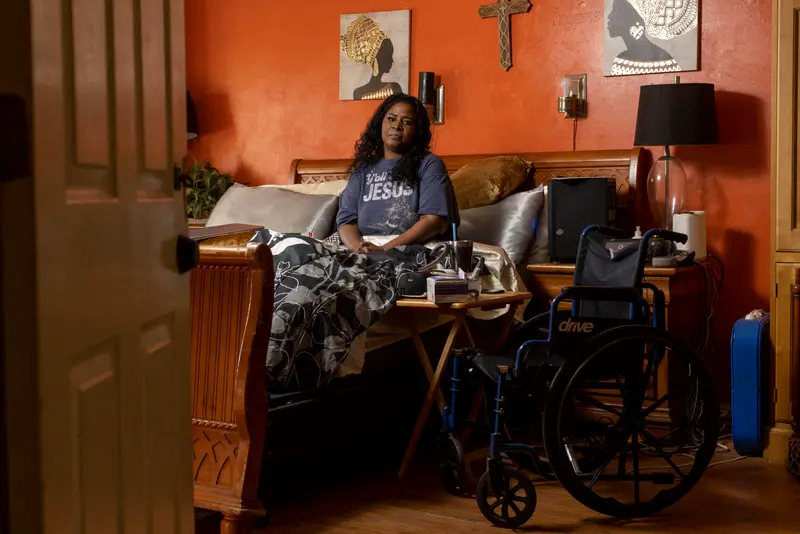
Palmetto disconnected her electricity anyway. Dockery at the time received $375 a month in disability payments, making it difficult for her to afford the 10% additional charge for paying her bill even a day late. With utility bills that often reached $350, plus a $30 service fee when Dockery was a week late, those charges added up quickly. Like Griffin, Palmetto provides residents with a single bill that includes water, sewer, trash and electricity; if they don’t pay the full bill on time, the city cuts off their electricity first. “That is the thing that people respond to quickly,” explained city clerk Cindy Hanson, though she added that she did not work for Palmetto when the policy was created decades ago.
Hanson said the small city relies on utility payments from its nearly 2,000 customers to balance its budget. The Georgia municipal utilities that ProPublica surveyed earn, on average, about 40% of their total revenue from providing electricity, though some individual cities’ percentages in recent years range from less than 20% to more than 60%. Local officials use that money to subsidize the costs of running their governments. They also use it to offset discounted power to large companies that set up shop in their cities. Griffin, for example, offers new businesses up to a 30% discount on utility rates for their first three years of operation.
Meanwhile, some utility representatives told ProPublica they were not able to provide automatic discounts or even extended grace periods to residents who use electric-powered medical devices. Instead, they said, they offer help on a case-by-case basis and encourage customers to take personal responsibility for paying their bills. Some cities, like Albany in southwest Georgia, recommend that customers with electric-powered medical devices acquire additional batteries or costly backup options such as a generator. Flint Energies, in central Georgia, does not have an official policy on disconnections for people with medical devices but provides a “courtesy call” to warn each customer that they might want to relocate to a place with electricity, such as a relative’s house, “when all options have been exhausted and a disconnection is unavoidable.”
Several smaller utilities offer advanced pay programs, which operate like a prepaid debit card — and allow a power company to immediately cut off power once a customer has reached their allotted amount of electricity. The utilities often market these plans to low-income customers as a way to help them avoid using more electricity than they can afford. But energy and utility law experts cite studies showing these programs can result in more exorbitant fees and more frequent disconnections than regular payment plans. Some utilities refuse to allow customers on prepaid plans to enter into payment plans, leaving them with limited options if they run out of money for electricity.
Coastal Electric Cooperative’s Bolton said the utility helps seriously ill customers facing disconnection pay bills with one-time donations from an emergency fund called “Helping Hands,” stocked by employees’ voluntary contributions. “That’s kind of an example of having policies that fit the people that you serve, and maybe not trying to be so big that you just have to have a uniform cookie cutter policy for everybody,” he said.
State Sen. Frank Ginn, a Republican who has led two legislative committees that oversee power companies, said smaller utilities work best when they regulate themselves. A former employee of smaller Georgia utilities, he has pushed for reduced state regulation of cities on a number of issues, arguing that such regulation ties the hands of local leaders and raises costs for residents. “We have somebody that’s just looking after the public, and that’s the elected officials,” he said.
Ginn said residents should advocate for themselves with their local elected leaders before reaching the point of being disconnected multiple times. “I guarantee you, if they were on top of the communications better, there would probably be a much better outcome,” he said.
On a chilly morning this past December, Marsden walked into City Hall, hopeful that Griffin was ready to change. After years of Marsden questioning officials, filing open records requests and writing formal complaints, the city was now unveiling proposed changes to its disconnection policy for the first time since she moved there. But as she sat in the audience, Marsden realized that the changes proposed were limited for seriously ill customers. The city was considering only an additional one-day extension for those customers to pay before getting disconnected, as well as a requirement for officials to “attempt to call” customers before disconnecting them.
After the meeting, Marsden approached one of the utility’s staff members to lobby for more protections but secured no promises to strengthen the proposal.
The overall proposal fell short of the best practices experts have identified for utilities seeking to protect seriously ill customers. A report published by the NCLC recommended that utilities give seriously ill customers at least 30 days to pay their bills before being disconnected, with the ability to have their payment period extended, and inform those customers ahead of time if they qualify for the protections.
That night, Marsden had one more chance to convince elected officials. During public comments at the city commission meeting, she urged her elected officials to consider something she’d recently learned through her ongoing research: Other utilities serving residents in Spalding County — where Griffin is located — had provided customers with more time to pay bills before being disconnected.
“I don’t know if you understand how embarrassing it is just to say, ‘I’ve been disconnected four or five times,’” Marsden said. But she said she was willing to share her story “to make sure that we have policies in place, that we’re going to look out for people and that we’re going to protect each other.”
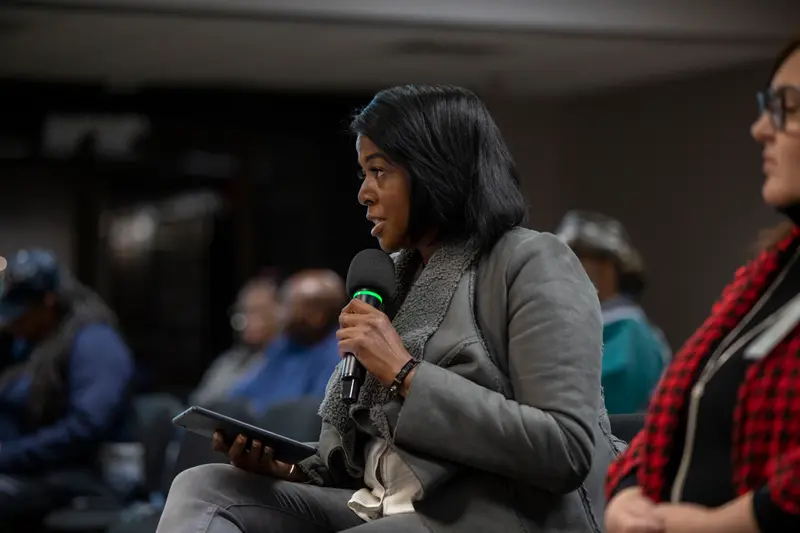
Hollberg, a local insurance agent who serves as Griffin’s mayor, pushed back against Marsden’s plea. He said at the meeting that Griffin once used to lose around $3 million in uncollected bills each year. After cracking down on customers who hadn’t paid, the city now had a tenth that much in delinquent collections, he said. As Hollberg saw it, providing the extra accommodations sought by Marsden — even to the tiny fraction of Griffin’s customers who were seriously ill and facing economic hardship — went against what he believed were his “financial responsibilities” as an elected official.
Hollberg then called for a vote to approve the limited proposal. As Marsden watched from the front row, she strained to maintain her composure. She had fought hard for protections for herself and other Griffin residents and followed all the rules for public input, only to end up barely better off than where she started.
Within seconds, the proposal unanimously passed.
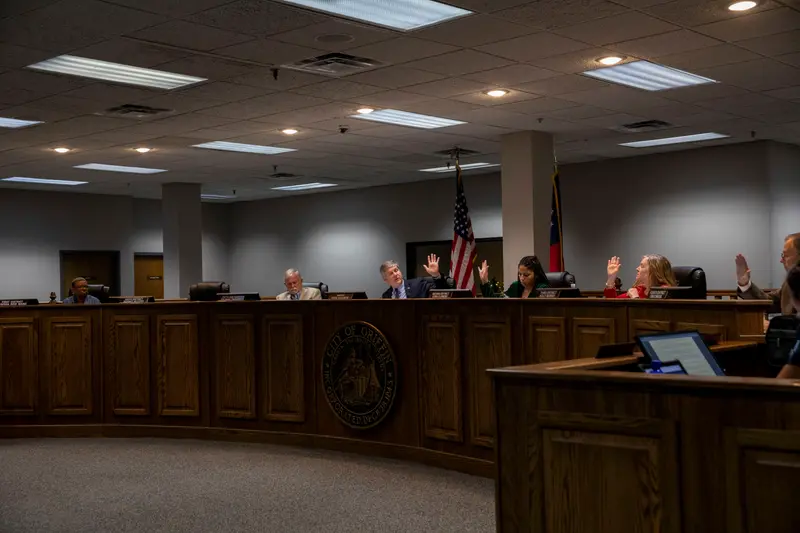
Mollie Simon contributed research.
